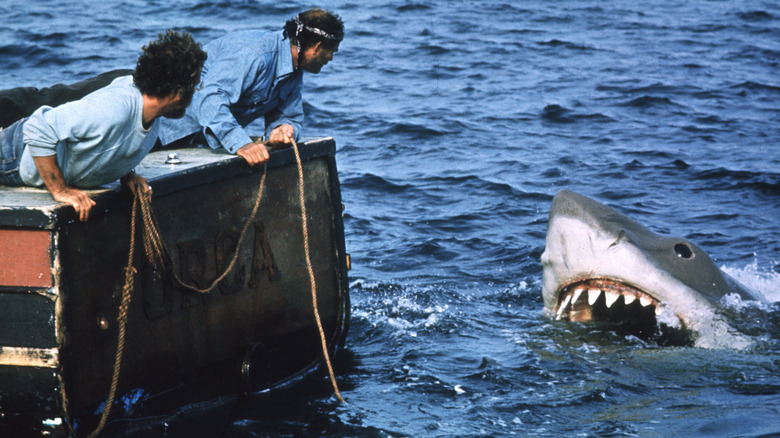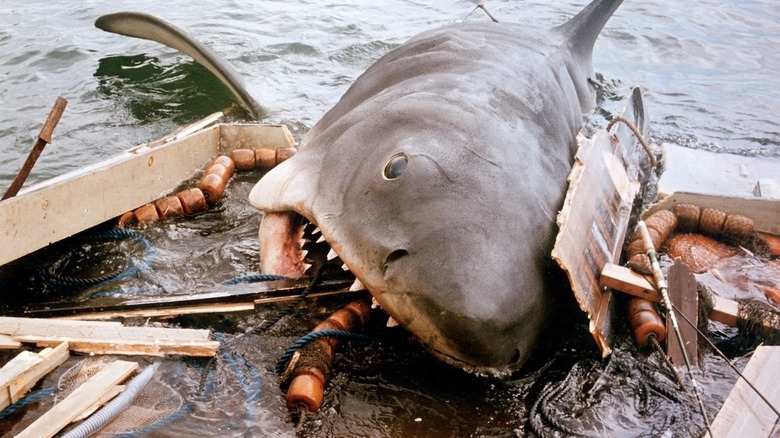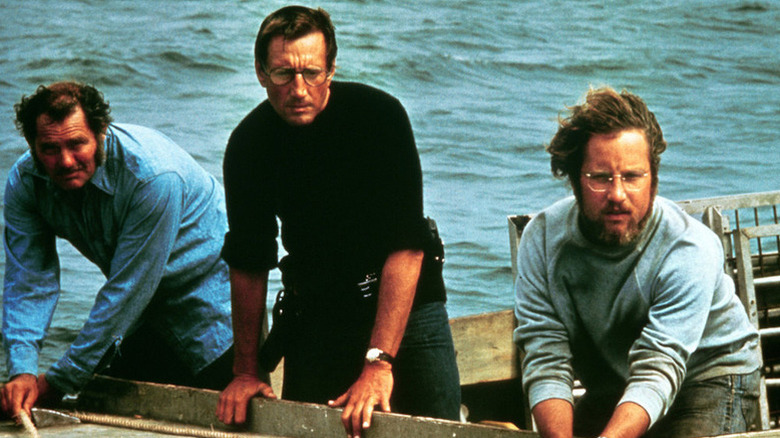As we continue to celebrate the 50th anniversary of “Jaws,” cinema enthusiasts everywhere can wax poetic about the film’s impact as the godfather of the modern blockbuster. The 1975 big screen adaptation of Peter Benchley’s novel of the same name not only captivated audiences and frightened them from visiting the beach that summer, but it also served as the ultimate calling card for the filmmaker who would be king: Steven Spielberg. After making his feature-length debut with his television film “Duel” and his theatrical debut with “The Sugarland Express,” Spielberg ventured into uncharted waters with “Jaws,” which was a notoriously difficult production for him.
“Jaws” was a cultural juggernaut, becoming the highest-grossing film ever at the time of its release (a record that Spielberg himself would break two more times with “E.T. the Extra-Terrestrial” and “Jurassic Park”). Adjusted for ticket price inflation, it is the 7th highest-grossing film in history, according to Box Office Mojo. “Jaws” would go on to receive four nominations at the 48th Academy Awards, including: Best Picture (Richard D. Zanuck and David Brown, producers), Best Original Score (John Williams), Best Film Editing (Verna Fields), and Best Sound (Robert L. Hoyt, Roger Heman, Earl Madery and John Carter). The film lost Best Picture to “One Flew Over the Cuckoo’s Nest,” but won in every other category it was nominated for.
But while it may have emerged victorious with three Oscar wins, there were a few categories where the Academy of Motion Picture Arts and Sciences egregiously snubbed the film.
Jaws failed to receive nominations for Best Director and Best Adapted Screenplay
Perhaps the most notable Oscars snub of them all was in the Best Director category, where Steven Spielberg missed the boat. Given that Spielberg endured one of the most tumultuous productions in Hollywood history and still managed to craft a film as compelling as he did, his snub still stings to this day. Spielberg not only mastered the thrills and tension of the story, particularly in the film’s most horrific sequences, but he also found the humanity within the film’s main characters, bringing out excellent performances from the cast.
Spielberg’s raw reaction to getting snubbed was captured on film, where he expressed his belief that he was “beaten out by [Federico] Fellini” for one of the nomination slots. History is clearly on Steven Spielberg’s side, but to play devil’s advocate, the Best Director category at the 48th Academy Awards featured one of the most insane rosters in the ceremony’s history: Federico Fellini for “Amarcord,” Stanley Kubrick for “Barry Lyndon,” Sidney Lumet for “Dog Day Afternoon,” Robert Altman for “Nashville,” and the category’s winner, Miloš Forman for “One Flew Over the Cuckoo’s Nest.” Talk about a murderer’s row.
Along with Steven Spielberg’s snub, “Jaws” was ignored in the Best Adapted Screenplay category. The films nominated that year included “Barry Lyndon,” “The Man Who Would Be King,” “Profumo di Donna,” “The Sunshine Boys,” and the winner, “One Flew Over the Cuckoo’s Nest.” While “Jaws” is often discussed as a directorial achievement, one must not forget about the remarkable screenplay that was credited to both Peter Benchley, who wrote the script’s first drafts based on his book, and Carl Gottlieb, who rewrote it during principal photography.
The script for “Jaws” explores timeless themes of political corruption and capitalism trumping public safety, while also telling a human, personal story through the eyes of one Martin Brody (Roy Scheider). Brody’s world-weariness with his job as the police chief of Amity Island is juxtaposed with his family life, and conquering his phobia of the ocean plays into the inherent human attraction to stories of overcoming fear. While audiences initially flocked to theaters to see a killer shark, it was ultimately the human story at the core of “Jaws” that hooked people to see it over and over again.
No nominations for Roy Scheider, Richard Dreyfuss, and Robert Shaw
Much of what made “Jaws” one of the most captivating films of the 20th century is that, amidst the thrilling spectacle of a killer shark on the loose, the film is ultimately carried by the three central performances, all of which deserved recognition from the Academy. Roy Scheider’s Chief Martin Brody serves as the film’s protagonist and audience avatar, and he is the perfect everyman for this story. As he deals with the stresses of a killer shark, as well as the rising body count, some of the film’s most memorable scenes are on the quieter side. In one of the most tender moments that perfectly showcases Spielbergian magic, Brody gets cheered up at the dinner table when his son Sean (Jay Mello) mimics his actions.
Marine biologist Matt Hooper is brought to life extraordinarily well by Richard Dreyfuss, whose affability and charm bring some much-needed levity to the film’s most tense moments. However, the film’s standout performance comes from Robert Shaw as Quint, the eccentric, obsessed shark-hunter. Quint’s role in “Jaws” is bookended by both one of the greatest entrances for a character and one of the most upsetting exits in cinematic history, and all of that is sold to near-perfection by Shaw.
Roy Scheider, Richard Dreyfuss, and Robert Shaw’s performances are elevated to legend status in the third act of “Jaws,” solidifying them as one of the seminal trios in all of cinema. The tension that permeates them while sailing on the Orca is so palpable, much of which can be attributed to the real-life feud between Dreyfuss and Shaw, whose mutual dislike of one another played into their performances perfectly. The trio’s performances and experiences filming “Jaws” were dramatized in the original play, “The Shark is Broken,” which was written by Shaw’s real-life son, Ian Shaw (who also played his father in the production), and Joseph Nixon.










